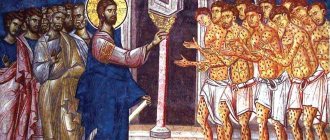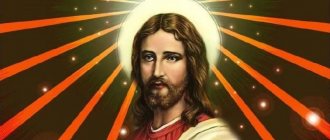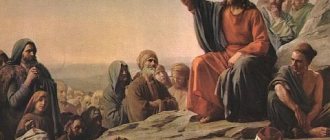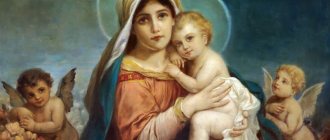Composition of the Old Testament
Biblical Judaism. Composition of the Old Testament.
Lecture 2.
The Old Testament is a description of the Sacred history of the Jewish people. The religion of the ancient Jews is amazing, unique and inimitable in many respects, but most of all because the main character in it is the Jewish people themselves, which the creators of this religion consider to be especially chosen and marked by God. The Holy Scriptures of the Jews tell us that God promotes and helps his people as a beloved and disobedient child, but at the same time subjects them to severe trials, sometimes leaving them without his help and care. The history of the Jews is the history of people’s relationships with God, which is why it is called not just history, but Sacred History, and, for the edification of humanity, it is set out in great detail in the oldest part of the Bible - the Old (Old) Testament. It describes real events and people in a fascinatingly interesting and instructive way: conflicts, wars, just and unjust rulers, wise prophets, endless debates about truth and God). Most of the facts of Sacred history are confirmed by data from historical research and archeology. The Bible is a sacred book for all Christians, and, therefore, the instructive Sacred history of the ancient Jews became the most important element of their faith, without which it is impossible to fully understand and comprehend the teachings of Christ. The Old Testament forms the basis of the Holy Scriptures of the religion of modern Jews - Judaism and, thus, is the common source of wisdom for many millions of believers around the world - Jews and Christians. But even for those who do not consider themselves followers of any religion, knowledge and understanding of the Old Testament is absolutely necessary for full-fledged internal spiritual development. After all, the Bible itself is the greatest and fundamental foundation on which the edifice of European culture and the culture of many peoples of the world on other continents is built.
Judaism appeared 1000 BC. on the territory of Palestine, and over the 3000-year existence in this religion, 2 main eras are distinguished: 1. Biblical (Old Testament, Palestinian) 11–10 centuries. BC-1st century AD, and 2. The era of the Diaspora (Talmudic-rabbinic) - 1st century. AD-21st century AD
By the III-II centuries. BC. The main parts of the Holy Scriptures of the Jews were finally formed. It opens with the Pentateuch, the authorship of which is attributed to the prophet Moses (books: Genesis, Exodus, Leviticus, Book of Numbers, Deuteronomy). There is an opinion that the Pentateuch received its completed form by the beginning of the 7th century BC. e.
“Bible” literally means “books” in Greek. Initially, this word meant “collection of manuscripts”, “library” and only later began to be used exclusively as the name of the collection of sacred books of Christianity and Judaism. The Bible is not a complete work; it is really a kind of “library” that contains books of various genres. The Bible has it all. Coming from ancient times, myths about the origin of the world and man and detailed descriptions of religious rituals, codes of moral and legal norms and historical narratives, philosophical reflections on the meaning of human existence and banal everyday wisdom, cheerful love lyrics and gloomy prophecies about the end of the world and the catastrophes that precede it . There is artwork, messages, parables, hymns and more. All this belongs to the pen of many dozens of authors who lived at different times. The earliest texts of the Old Testament date back to the 13th-11th centuries BC, and the oral tradition underlying a number of books goes back even further. The latest writings of the Old Testament date back to the 2nd-1st centuries. BC e. The New Testament was completed by the beginning of the century AD. e. Thus, if we take the Christian Bible as a whole, it was created over almost a millennium and a half.
The Old Testament takes up approximately 4/5 of the entire Bible. “Old” means “old” and “testament” in this case does not mean “testament” (this is the literal meaning of the word) but rather “union”, “contract” or “agreement”. The Old Testament is therefore an “old covenant.” This name was given to the ancient Hebrew sacred books due to the fact that the main idea of most of them is the idea of a contract between the god Yahweh and the Jewish people. In Orthodox editions of the Bible, the Old Testament includes, as a rule, 50 books, which, according to the degree of their authority for Christians, are divided into two parts: 39 canonical books and 11 non-canonical. The canon (Greek “rule”, “model”) is a set of those books of the Bible that are recognized by the church as divinely inspired. The divine inspiration of canonical books means that they are of sacred origin. It is believed that their authors wrote down exactly what God himself inspired them with, who thus acts as a guarantor of the absolute truth of the canonical books of the Bible.
Non-canonical books, which form something of an appendix to the canon, are treated differently in different branches of Christianity and Judaism. The Orthodox Church considers them as useful for reading, edifying books, but denies their divine inspiration. This means that the content of non-canonical books reflects only the personal opinion of their authors, which, in principle, may be erroneous. The Catholic Church recognized these books as deuterocanonical and therefore inspired by God. In Protestant editions of the Bible, on the contrary, non-canonical books, as a rule, are completely absent. They are not in the Jewish Bible either.
These differences have developed historically. At the beginning of our era, there were two collections of Hebrew sacred books: the Alexandrian canon, the oldest translation of the Old Testament from Hebrew into Greek, which consisted of 50 books, and the Palestinian canon, which included only 39 books. The Palestinian canon was established in Judaism. The Christian Church made a choice in favor of the Alexandrian canon, but those 11 books that were contained only in it began to be considered non-canonical. Later, some Christians (Protestants of various denominations) returned to the Palestinian canon accepted in Judaism. So the composition of the Old Testament may be different depending on which religion a given edition of the Bible belongs to.
Based on the content of the Old Testament books, they can be divided into four groups: 1. The Pentateuch of Moses, 2. historical books, 3. books of wisdom, or instructive books, 4. books of the prophets.
"The Pentateuch of Moses" . The first and most important part of the Old Testament received this name in Christianity, because it really consists of five books, the author of which is considered by Jewish and Christian tradition to be the prophet Moses, who is also the main character of most of these books. Judaists call the entire Pentateuch the Torah (“Torah” translated from Hebrew means “teaching” or “law”) , and its individual books, according to the ancient custom of many peoples of the East, are designated by their first words “In the beginning”, “And these are the names”, “And he called,” “In the wilderness,” “These are the words.” At the beginning of our era, Christians gave these books titles that reflected their content to one degree or another. In editions of the Bible in Russian they sound like this: Genesis, Exodus, Leviticus, Numbers, Deuteronomy.
Book of Genesis. About the origin of the world and man. The title of this book seems a little strange at first glance. However, the word “being,” in addition to what is generally accepted now, once had another meaning – “emergence,” “beginning,” which is quite consistent with the content of the first book of Moses, at the very beginning of which there really is a story about the emergence of the world and man.
God begins the process of creation with the creation of heaven and earth, then land and sea, plants, heavenly bodies, birds and fish, domestic and wild animals appear, and finally, as the crown of creation, man appears.
The First Testament and the Fall . One way or another, the first people - Adam and Eve - were created and God entered into a covenant with them, that is, an agreement under the terms of which people were provided with heavenly life (in the literal sense of the word), in return it was required not to pick fruit from the “tree of the knowledge of good” and evil." Very soon the agreement was broken. The tempting serpent (according to the orthodox canon, he is a fallen angel, Satan), who found himself in paradise, persuaded Eve to taste the forbidden fruit (according to the tradition that developed in the Middle Ages, it is usually depicted in the form of an apple, but the text of the Bible itself does not say anything about this). Adam followed her example and the Fall was accomplished. As punishment, Adam and Eve were expelled from paradise and denied immortality. In addition, Adam had to work all his life by the sweat of his brow, and Eve had to give birth to children in pain. In Christianity, the transgression of Adam and Eve is considered as the original sin of the entire human race, a sin passed on from generation to generation and lying on a person from the moment of his birth. To give humanity the opportunity to get rid of this terrible legacy, it was necessary, as Christianity claims, the atoning sacrifice of Jesus Christ. But even after making this sacrifice, any person, when born, is not free from original sin, and, according to Christian teaching, gets rid of it only by accepting the Sacrament of baptism.
The beginning of human life on earth. Once outside of paradise, Adam and Eve immediately acquired offspring. At first they had two sons - Cain and Abel. The first of them became a farmer, the second - a cattle breeder. One day they both sacrificed to God the fruits of their labor. God accepted Abel’s offering, but did not even look at Cain’s gift. Overcome by envy and anger, Cain killed his brother and was exiled for it. Then Eve gave birth to another son, Seth, from whom the human race originated.
The cause of the global flood was the sinfulness of the descendants of Adam and Eve, whom God decided to destroy by staging such a grandiose catastrophe. An exception was made only for the righteous Noah. At the direction of God, Noah built an ark (a large boat), in which he himself, his family and “representatives” of all kinds of animals were saved from the flood: “Bring also into the ark two of every living creature, and of every flesh...” (Gen. 6: 19). After the flood, God makes a covenant with Noah, promising not to curse or destroy people anymore.
Noah had three sons - Shem, Ham and Japheth, with whom the Bible connects the beginning of the division of humanity into nations. Each of them became the ancestor of large groups of peoples. So Shem is considered the common ancestor of the Jews and a number of other peoples (they are usually called Semitic). The appearance of different languages was a consequence of the unheard-of audacity of people. Gathering in Babylon, they decided to build a tower as high as the sky. In order to prevent this, God confused their language, and the people, no longer understanding each other, stopped building the tower and scattered throughout the entire earth.
The story of the biblical patriarchs. The first of them was Abraham. This man was born in the city of Ur in the southern part of the Tigris and Euphrates Rivers. Abraham had already lived a long life when the Lord himself called him to leave his homes and go northwest to the land of Canaan (between the Jordan River and the Mediterranean coast), promising to produce from this man a great and blessed nation. Abraham wandered for a long time, accompanied by his father, his wife Sarah, his nephew Lot, and probably servants, associates and relatives. When the travelers reached Canaan, a terrible famine broke out there, and they were forced to go to a more well-fed Egypt for a while. On the way from this country back to Canaan, Abraham was separated from Lot, who remained to live in the vicinity of the Jordan River, where the cities of Sodom and Gomorrah were located. But soon a tragedy occurred. God, angry with the inhabitants of these two cities for their sins and wickedness, condemned them to destruction. He brought down “sulphur and fire from heaven” on Sodom and Gomorrah, and all living things in and around these cities perished. The name Sodom (sodomy) became a symbol of sin and divine wrath. Abraham and his wife continued to live a shepherd's life in Canaan, but God did not give Sarah any offspring. And finally, in one of his appearances to Abraham in the guise of three Angels (Orthodox Christians call them the “Old Testament Trinity”), the Lord predicted that ninety-year-old Sarah would have a son. Soon she gave birth to Isaac, from whom, according to the Bible, the Jewish people came. The father passionately loved his only legal heir, Isaac, at that time, and therefore God, tempting Abraham and testing the strength of his faith, commanded the elder to sacrifice his son: after all, one must offer to God the most precious thing that a person has! Obedient Abraham laid wood on Isaac to burn the sacrificial body, took fire and a knife with him, and together they, obedient to God's will, headed to the top of one of the mountains. But at the decisive moment, when the knife was already raised over Isaac, the Angel pulled Abraham's hand away. His faith and fear of God were now fully proven, and no innocent blood was shed.
The son of Isaac and grandson of Abraham was Jacob. Jacob went down in history under another name - Israel (God's Warrior), which he received after a night battle with a mysterious stranger, who turned out to be the Angel of God himself. Scientists explain this very interesting and mysterious plot by the ancient custom of initiation into religion, which consisted of a ritual “duel” of the initiate with a deity and after this giving him a new name. From Jacob’s second name, Israel, the Jews began to be called “the people of Israel,” hence the name of the ancient and modern Jewish state. Jacob-Israel, like his ancestor Abraham, wandered for a long time and at the end of his life settled in Egypt, where he went to his youngest son, Joseph. Joseph ended up in this country, having been sold into Egyptian captivity by his wicked, envious brothers - the eldest sons of Jacob. But there, thanks to his intelligence and talent, he became a major official under the pharaoh. In the end, Joseph forgave his brothers and even settled them in Egypt, and they repented of their disgusting act. So the whole family ended up in this country - the elderly and sick Jacob, his 12 sons and only daughter. From the sons of Jacob-Israel (Benjamin, Simeon, Levi, Judah and others) came twelve branches (tribes) of the Jewish people. The fourth eldest son, Judas (not to be confused with Judas Iscariot, the traitor of Christ), gave his name to the name of the Jewish religion - Judaism. From the “tribe of Judah” came kings David and Solomon, and later Jesus Christ.
At this time, famine occurred again in the land of Canaan, and a significant part of the Jews also moved to Egypt. Probably, at that time, Jewish tribes, fleeing crop failures or enemy raids, often migrated to this country and especially to its northern part, where there were many fertile valleys in the Nile Delta. If at first everything went well, then soon the Jews found themselves in Egypt in the position of slaves, an inferior race. The pharaoh began to use foreigners for the most difficult construction work. Thus began a long period of “Egyptian captivity”, from which the Jews emerged as a completely different people - united by a common desire to return to their homeland in Canaan and a common religious idea.
Exodus of the Jews from Egypt. At the beginning of the book of Exodus we learn that several centuries have passed since Jacob-Israel and his sons came to Egypt. And now a large people lived in this country, calling themselves “the sons of Israel” after the common ancestor Jacob-Israel and consisting of 12 tribes, or tribes, each of which traced its genealogy to one of his sons: the tribe of Levi, the tribe of Judah, etc. d. The pharaohs, forgetting about the services Joseph once provided to their ancestors, cruelly oppress the Jews by sending them to the most difficult jobs, and even, trying to reduce the number of this people, order the killing of newborn babies. It was at this time that Moses, the greatest of the Old Testament prophets, was born into one family of the tribe of Levi. His mother, in order to save her son’s life, threw Moses to Pharaoh’s daughter, who raised him. When Moses grew up, he, standing up for his fellow tribesman, killed the Egyptian overseer and was forced to flee Egypt. And then one day, when Moses was tending his flocks near Mount Horeb (on the Sinai Peninsula east of Egypt), God appeared to him in the form of a burning but not burning thorn bush and said that he was the God who made covenants with Abraham, Isaac and Jacob. It is to Moses that he first reveals his name - Yahweh (in the Russian text of the Bible “I am Who I Am (Jehovah)” - Exodus 3:14), which should be considered as a sign of a special revelation given to Moses. Yahweh also told Moses that he knew about the suffering of the Jewish people and would deliver them from slavery in Egypt. Moses must become a kind of authorized representative of Yahweh in His leadership of the Jewish people, in connection with which Moses receives the command to go to Egypt and bring his people out from there. With great difficulty, Moses managed to force Pharaoh to release the Jews. But as soon as they left Egypt, the pharaoh, regretting his decision, set off with his army in pursuit. Yahweh delivered the Israelites from persecution with the help of a miracle - the sea parted and they walked along its exposed bottom. When Pharaoh and his army entered there, the sea returned to its place and swallowed them up. Thus free, the sons of Israel arrived three months later at Mount Sinai, where the most important event in their history was to take place - the conclusion of a covenant with God Yahweh.
The Covenant of Mount Sinai and its main provisions. This covenant is the last and most important of all the agreements between God and people, which are spoken of in the Pentateuch. Its main conditions are as follows: the Jews must honor the god Yahweh and in no case worship other gods, and Yahweh will make them his chosen people and will be patronize. This patronage will be expressed in particular in the fact that the Jewish people will be given ownership of the fabulously rich land of Canaan. The obligations imposed by the covenant on the people of Israel are listed in somewhat more detail in the so-called Decalogue - the ten commandments that God gave to Moses on Mount Sinai. These commandments prohibit: 1. Worshiping a god other than Yahweh, 2. Making idols for yourself (idols and other images), 3. Taking the name of God in vain (that is, the name “Yahweh”); and demand: 4. Consider Saturday a holiday and not work on this day, 5. Honor father and mother, 6. Do not kill, 7. Do not commit adultery, 8. Do not steal, 9. Do not bear false witness, 10. Do not covet the house. and other property | your neighbor (Exodus 20:3-17).
Leviticus. In addition to the ten words, Moses receives many more instructions on Mount Sinai, both moral and legal, and, especially, ritual. The latter make up the book of Leviticus following the Exodus. It is entirely devoted to religious and ritual problems. A lot of attention is paid here to sacrifices. It is precisely indicated in which cases they must be performed; which animals can be sacrificed and which cannot; The process of sacrifice is described in detail. There are many regulations regarding the consumption of food: they talk about the meat of which animals can be eaten and which ones cannot be eaten. This book contains sanitary, hygienic, medical and some other instructions.
Numbers. The road to Canaan. After the covenant was made, the Jews set out on their journey to the land they had been promised. How it happened is described in the fourth book of the Pentateuch - the book of Numbers. What happened on the long and difficult journey to Canaan. It was necessary to fight with tribes that refused to let the Israelites pass through their lands; more than once part of the people rebelled against Moses, and sometimes the entire people showed obstinacy and disobedience to Yahweh, who was forced to punish him. And so, when the Jews came very close to Canaan, scouts were sent, confirming the fabulous wealth of this land; they also reported that its cities were well fortified and inhabited by a brave and strong people. Then the Israelis, frightened, declared that it would be better to return to Egypt than to die fighting a strong enemy. This was a grave sin, for they doubted not their own strength, but the power of Yahweh, who was supposed to give Israel victory. The corresponding punishment was also severe: the Jews had to circle in the desert for forty years so that only the descendants of those who had sinned could enter the Promised Land. In addition, these forty years are filled with events in which the disobedience and unbelief of the people were manifested, which is described in detail and colorfully by Josephus in “Antiquities of the Jews.”
Deuteronomy. And then one day even Moses himself doubted that Yahweh could give them Canaan. For this, Moses was not destined to enter the promised land. But before he dies, he makes a long speech addressing the people of Israel, the presentation of which takes up almost the entire last book of the Pentateuch - Deuteronomy. The main attention is paid to legal, moral and ritual requirements. At the age of one hundred and twenty years, Moses dies. The Israelites prepare to cross the Jordan River and begin their conquest of Canaan. This concludes the Pentateuch of Moses.
Are we donating half a Bible to a museum?
And really, why? Old clothes or furniture are usually not used, they are replaced with new ones. The name “decrepit” seems to suggest that the first part of the Bible has also “dilapidated” and has lost its meaning for us. Is it so? It's not just the name (the Slavic "old" simply means "old, former"). After reading the New Testament and moving on to the Old, a person often experiences disappointment: it is both boring and irrelevant, but most importantly, there is too much blood on its pages. In the New Testament, too, not everything is clear and not everything is interesting, but hardly anything repels the reader so much. Someone might think that we are talking about two different gods...
A similar idea was expressed by the theologian of the 2nd century AD, Marcion of Sinope. He taught that there are two gods: the cruel Creator, about whom the Old Testament tells, and the merciful God of Love, revealed in the New. There is nothing in common between them; before Christ, people supposedly did not know the God of Love and worshiped the cruel Creator, mistakenly taking him for the highest deity.
Interestingly, Marcion’s disagreements with traditional Christianity did not end there. In order to “separate” the two Testaments, he had to significantly shorten the New. Marcion left only one Gospel and ten apostolic epistles, and from there he threw out everything that concerned the physicality of Christ, the reality of His earthly life. Marcion professed the dualism characteristic of Eastern religions: all matter, all corporeality is evil, and one must get rid of it for the sake of spiritual perfection, therefore Christ only looked like a man, but was only an incorporeal spirit who flew down from heaven to tell humanity about the True God. He was not born and did not die on earth; the suffering on the Cross, after which He ascended to heaven, was only an appearance. Of course, His disciples mixed up a lot of things and wrote them down incorrectly (this is a reservation made by almost everyone who wants to “edit” the Gospel to their own liking).
This teaching was rejected by the Church; its inconsistency was analyzed in detail, point by point, by almost all prominent church writers of that time. Indeed, such “Christianity” is incompatible with the very foundations of the faith of the Church. But it is suitable for Gnostics and all sorts of near-Christian sects seeking to use the Bible for their own purposes. The Church, on the contrary, has proclaimed and confirmed more than once that the Holy Scriptures, consisting of the Old and New Testaments, are inseparable for it.
To reject the Old Testament means to reject the flesh, the human nature of Christ. The point is not only that in His story the prophecies and hints with which the Old Testament is full are fulfilled, so that in the Gospels both the place (birth in Bethlehem), and the time of events (the crucifixion before Easter), and even individual details (Roman soldiers) turn out to be significant They did not break the legs of Jesus, just as they could not break the bones of the Passover lamb).
The point is also that the history of salvation for a Christian begins not with Christmas, but with the moment of the fall of man, when the very need for salvation arises. After all, you first need to understand what humanity needs to be saved from, why it turned out to be separated from God and enslaved to death. This is exactly what is said in the Old Testament. Moreover, its “bloodyness” is largely explained by the fact that it is an honest and detailed story about the fallen
humanity, and not a Christmas story about something cute, but completely unreal. And if we are also honest, we will have to admit that it was the Old Testament that, better than all other ancient books, managed to curb and limit this “bloodyness.”
In none of them was a person told with such amazing simplicity “do not kill, do not steal, do not commit adultery.” In fact, now people for whom murder, theft and adultery still remain a matter of valor and honor, at least try to disguise this attitude with various beautiful words. The recently released film “Apocalypse” shows a society where the commandment “thou shalt not kill” simply does not occur to anyone. I don't think we would want to be there. But once upon a time all of humanity lived like this.









